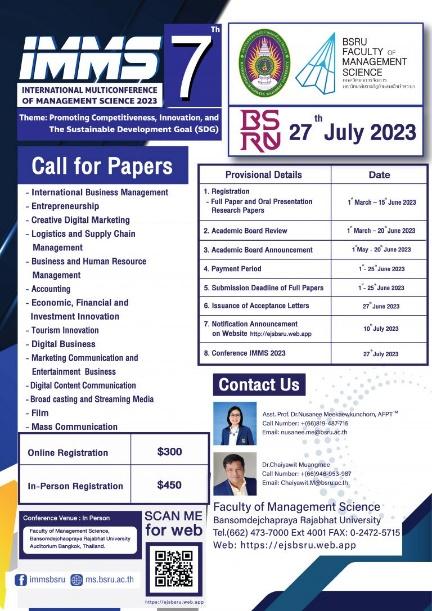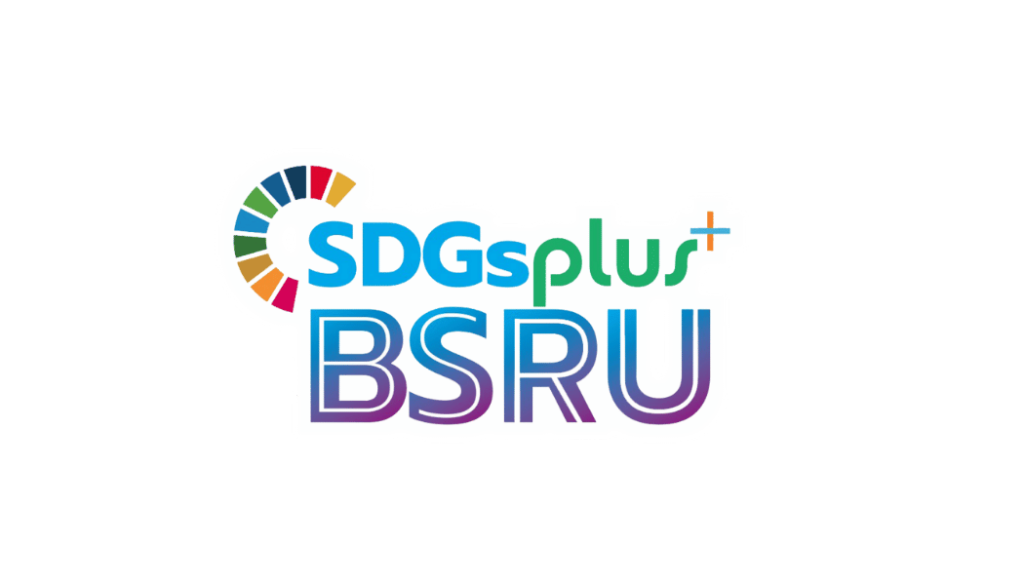To effectively address the UN Sustainable Development Goals (SDGs) through international collaboration and research, BSRU’s projects demonstrate comparative approaches that can serve as models for best practices. The three projects emphasize collaborative research, innovative adaptations, and community-centered approaches, which are crucial for addressing SDG challenges in diverse contexts.
7th National and International Conference on Management Science:
This annual conference organized by BSRU’s Faculty of Management Science promotes innovative competitiveness aligned with the SDGs, bringing together international participants to discuss sustainable strategies across management disciplines. By fostering global exchanges on innovative practices, the conference encourages SDG-focused development that can be adapted to local and international management challenges. This project illustrates a best practice in creating platforms for knowledge sharing and interdisciplinary collaboration, essential for advancing SDGs like SDG 8 (Decent Work and Economic Growth) and SDG 9 (Industry, Innovation, and Infrastructure). Moments from the 7th IMMS can be seen on our Facebook page.


3rd National and International Conference on Next Normal Readjustment for Future Sustainable Development:
In response to global disruptions and evolving sustainability needs, this conference centers on adapting to the “next normal,” encouraging discussions on resilience and sustainable development. Through collaboration with multiple institutions, the conference explores adaptive strategies across sectors. This initiative supports SDGs by promoting resilience and innovation, particularly SDG 11 (Sustainable Cities and Communities) and SDG 13 (Climate Action), highlighting a best practice of flexible, future-focused collaboration that equips stakeholders to respond to evolving sustainability challenges in a globally interconnected world.

3LoCo Network Model (Three Localities Collaborative):
The 3LoCo Network Model, or “Three Localities Collaborative,” represents a best practice in SDG-aligned international collaboration and research. Developed in partnership with Thailand’s Ministry of Higher Education, Science, Research, and Innovation (MHESI) and partner institutions like Bansomdejchaopraya Rajabhat University, Chandrakasem Rajabhat University, and Nakhonpathom Rajabhat University, this project applies the Sufficiency Economy Philosophy (SEP) to support sustainable community practices and regional development.

Through this collaboration, 3LoCo leverages comparative approaches to sustainable development by integrating SEP principles in both domestic and international contexts. In March 2023, BSRU and its partners organized community outreach activities at the National University of Laos (NUOL) in Vientiane, Laos. This cross-border initiative allowed researchers and community leaders from Thailand and Laos to share knowledge on SEP and explore sustainable development models relevant to local and regional needs. The 3LoCo model empowers communities through practical education and resource management techniques, which are adapted to fit diverse socio-economic settings, thereby addressing SDGs such as SDG 1 (No Poverty) and SDG 8 (Decent Work and Economic Growth).

By focusing on the practical application of SEP and its adaptability in varying socio-cultural landscapes, the 3LoCo model embodies a collaborative approach to the SDGs, promoting best practices through knowledge-sharing and community-centered learning. This project also strengthens SDG 17 (Partnerships for the Goals) by facilitating multi-stakeholder engagement, fostering sustainable economic practices, and promoting a cross-cultural dialogue on self-sufficiency and resilience. Through international collaboration and research, 3LoCo stands as a replicable model for tackling SDGs by aligning economic philosophies with sustainable development tailored to local and regional contexts.






